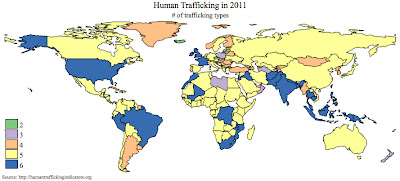A weekly links roundup of human trafficking news.
Friday 13 December 2013
Tuesday 10 December 2013
Human Rights Day
 |
| Eleanor Roosevelt holding the Declaration of Human Rights (photo source: UN) |
As the world remembers and celebrates the life and legacy of Nelson Mandela, it's fitting that on December 10th the world also celebrates Human Rights Day. This year is the 65th anniversary of Human Rights Day and the 20th anniversary of the Office of the UN High Commissioner for Human Rights and the adoption of the Vienna Declaration and Programme of Action.
Friday 6 December 2013
The Week in Trafficking
A weekly links roundup of human trafficking in the news.
Labels:
Australia,
Costa Rica,
Eritrea,
France,
India,
Jordan,
Linkage,
Micronesia,
Moldova,
Montenegro,
Myanmar,
Nepal,
Sudan,
Thailand,
Turkey,
United Kingdom,
US
Sunday 1 December 2013
Introducing the Human Trafficking Indicators Dataset
Scholars estimate that human trafficking will surpass drug
and arms trafficking in its incidence and economic effect during the next
decade (Schauer & Wheaton, 2006: 164-165; quoted in Wheaton, Schauer &
Galli, 2010: 114). The number of people trafficked is substantial—between
600,000 and 800,000 people were trafficked globally in 2005, and by 2009 an
estimated 12.3 million adults and children had been illegally trafficked (US
State Department, 2010). Other estimates place the number as high as 29.8
million (Walk Free Foundation 2013).
While the majority of countries in the international system
experience some form of human trafficking, little broad cross-national research
exists on its supply and demand factors. States from Chile and Colombia to
Georgia and France take substantial efforts in prosecuting human traffickers
and protecting victims, while others like Saudi Arabia, Niger, and North Korea
do not (US State Department, 2010). What explains the differing responses? Researchers
cannot say in any broadly cross-national sense. In part this is attributable to
the inherent empirical difficulties when studying any type of illegal
activity—the relevant actors have incentives to hide their actions. This
difficulty, however, is not insurmountable, and researchers have productively
studied other illegal activities like drug smuggling (Cornell, 2005; Reuter
& Greenfield, 2001) and illicit weapon sales (Small Arms Survey, 2003). Due
in part to both data limitations and normative interests, most human
trafficking scholars focus on the experiences of current and former victims
rather than the transnational dynamics of human trafficking flows or the
efforts that governments take (or do not take) to prevent human trafficking.
The Human Trafficking Indicators (HTI) project begins to
fill this significant gap by coding the cross-national variation in human
trafficking flows and government responses to them. The HTI dataset was created as part of a book project (tentatively
titled Understanding Human Trafficking)
focused on the quantitative analysis of human trafficking patterns around the
world and government responses to these patterns. The dataset codes
information about human trafficking flows between 179 countries and within them
from 2000 to 2011. It also includes disaggregated measures of government
efforts at prosecuting traffickers, protecting victims, and preventing future
trafficking.
I hope that this blog will be a means to exchange ideas with
other people, whether researchers, policymakers, or the general public as our
research goes forward. The real-world implications of increasing knowledge and
awareness of human trafficking is clear, and trafficking is becoming much more
in the global eye; however, researchers are only beginning to understand its global scope and the actions (and effects) of traffickers, their victims, governments, and concerned organizations. The HTI and the ongoing book
project are my way of trying to understand a complex, illicit, and growing
phenomenon. I look forward to your comments, critiques, and suggestions.
Subscribe to:
Posts (Atom)

